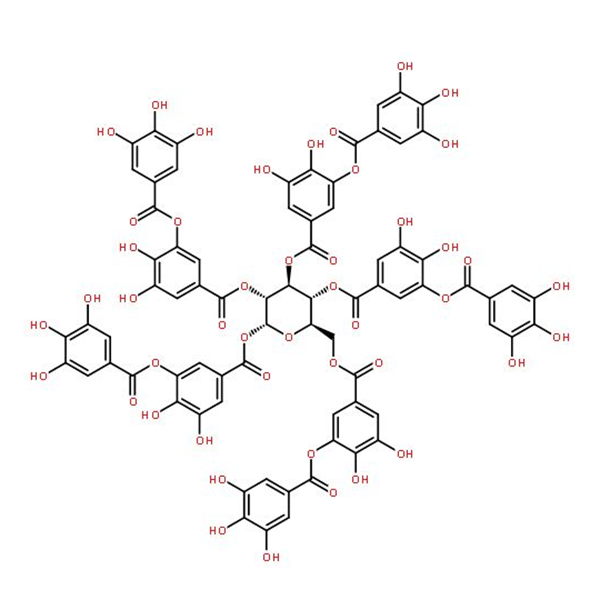
PRODUCTS CENTER
——
Propyl gallate
Product DetailsSpecification DataApplication
Product name: propyl gallate
Chemical name: propyl 3,4,5-trihydroxybenzoate
Structural formula: C₁₀H₁₂O₅/212.21g/mol
CAS: 121-79-9
Properties: This product is white to milky white crystalline powder, odorless. soluble in 1000 parts water, 3 parts ether or 2000 parts peanut oil;
| Items | Food grade Propyl gallate | Electronic grade Propyl gallate | |||
| Assay % | ≥99% | 99.9% | |||
| Gallic aicd % | ≤0.5% | ≤0.5% | |||
| Melting point ℃ | 146-150℃ | 146-150℃ | |||
| Loss on dring % | ≤0.5% | ≤0.5% | |||
| Lgnition residue % | ≤0.1% | ≤0.1% | |||
| trace metal content(ppm) | |||||
| Fe | - | <0.1 | |||
| Na | - | <0.1 | |||
| Mg | - | <0.1 | |||
| Al | - | <0.1 | |||
| K | - | <0.1 | |||
| Mn | - | <0.1 | |||
| Ni | - | <0.1 | |||
| Cu | - | <0.1 | |||
| Zn | - | <0.1 | |||
| Ca | - | <0.1 | |||
| Pb | ≤1 | <0.1 | |||
| As | ≤3 | - | |||
Propyl gallate, a derivative of Gallic acid and Propyl alcohol, is a versatile compound with a wide range of applications across various industries. Due to its antioxidant, stabilizing, and preservative properties, Propyl gallate is employed in diverse fields such as food, pharmaceuticals, cosmetics, feed, industrial manufacturing, and even some specialized applications. Its ability to protect products from oxidative damage makes it a valuable ingredient in ensuring the longevity, safety, and effectiveness of many commercial and industrial products. This passage delves into the specific applications of Propyl gallate in these different sectors.
Food Industry
In the food industry, Propyl gallate is primarily used for its antioxidant properties. It is widely recognized as an effective agent for preventing the oxidation of fats and oils, which is crucial in preserving the quality and shelf life of a variety of food products. Oxidation in fats can lead to rancidity, resulting in unpleasant flavors, odors, and a reduction in nutritional value. Propyl gallate is typically used in combination with other antioxidants such as Butylated HydroxyToluene (BHT) and Butylated HydroxyAnisole (BHA) to provide a synergistic effect, enhancing the stability of food products. This combination is particularly beneficial in foods that are high in fats, such as baked goods, fried snacks, processed meats, and margarine, where it helps prevent the premature degradation of fats and extends the shelf life of these products.
Propyl gallate’s application as an antioxidant is especially important in products that are susceptible to oxidative stress, such as oils, sauces, and salad dressings. It preserves the color, flavor, and nutritional profile of these products, ensuring they remain fresh and appealing to consumers. Additionally, Propyl gallate is employed in the formulation of certain beverages, such as fruit juices and soft drinks, where it helps prevent color fading and flavor loss due to oxidation.
Pharmaceutical Industry
In the pharmaceutical sector, Propyl gallate’s antioxidant properties are leveraged in various applications, particularly in health food supplements and pharmaceutical formulations. It is widely used to prevent the degradation of sensitive compounds in medications and supplements, ensuring the efficacy and stability of these products over time. Propyl gallate helps prevent the oxidation of vitamins, minerals, and other bioactive ingredients in supplements, which is crucial for maintaining their potency and effectiveness.
Propyl gallate is also employed as a pharmaceutical raw material in the synthesis of certain medications. Its role as an antioxidant is particularly valuable in the formulation of drugs that require stability under varying storage conditions. By preventing oxidative damage, Propyl gallate ensures that the active pharmaceutical ingredients (APIs) remain stable, which is crucial for the safe and effective use of these drugs.
Another significant use of Propyl gallate in pharmaceuticals is its potential application as a monomer antithrombotic drug. Antithrombotic drugs are used to prevent the formation of blood clots, which can lead to serious conditions such as heart attacks, strokes, and deep vein thrombosis. Research suggests that Propyl gallate, through its antioxidant effects, may play a role in inhibiting platelet aggregation and reducing the risk of clot formation. This potential therapeutic application adds to its growing significance in the pharmaceutical industry, particularly in the development of new drugs aimed at treating or preventing cardiovascular diseases.
Cosmetic Industry
The cosmetic industry also benefits from the inclusion of Propyl gallate in various products due to its potent antioxidant properties. Propyl gallate is frequently used in the formulation of cleansers, beauty creams, lotions, and other skincare products. Its ability to neutralize free radicals helps protect the skin from oxidative stress, which is a major contributor to the aging process. Free radicals, generated by exposure to environmental pollutants, UV radiation, and other external factors, can damage skin cells, accelerate the formation of wrinkles, and lead to a loss of skin elasticity. By incorporating Propyl gallate into cosmetic products, manufacturers are able to offer consumers a product that not only nourishes the skin but also helps to combat the visible signs of aging.
In addition to its antioxidant activity, Propyl gallate has anti-inflammatory properties that make it beneficial in soothing and protecting the skin. This makes it an ideal ingredient for formulations designed for sensitive skin, as it can help reduce redness, irritation, and discomfort. Propyl gallate is often included in moisturizers, serums, and sunscreens to enhance the overall efficacy of the product, providing both protective and restorative benefits.
Feed Industry
In the feed industry, Propyl gallate serves as an antioxidant to preserve the quality of various animal feeds, including those for pets, livestock, and aquaculture. Its use in the preservation of pet food, animal feed, and aquatic feed helps to prevent the oxidation of fats and oils, which can lead to the development of rancid smells and reduced nutritional value. In particular, Propyl gallate is valuable in preserving the freshness and flavor of canned pet food, ensuring that the product remains appetizing to animals and nutritionally sound.
Additionally, Propyl gallate is used in vitamin-enriched animal feed, as it helps protect sensitive vitamins, such as vitamins A, E, and C, from degradation due to oxidation. This ensures that the animals receive the full nutritional benefits of the feed, helping to promote optimal health and growth. In veterinary products, where maintaining the potency of active ingredients is crucial, Propyl gallate is employed to enhance product stability and efficacy.
Industrial Applications
Propyl gallate also finds significant use in various industrial applications, where its antioxidant and stabilizing properties play a crucial role. One of the key industrial applications of Propyl gallate is in the production of green fibers, where it serves as a stabilizer. Green fibers, which are derived from renewable resources and used in the textile and automotive industries, require antioxidants to prevent degradation during manufacturing and processing. Propyl gallate helps maintain the structural integrity of these fibers, ensuring that they retain their strength and durability throughout their lifecycle.
In the rubber industry, Propyl gallate is used as an antioxidant to improve the aging resistance of rubber products. Rubber materials are susceptible to oxidation when exposed to air, heat, and UV radiation, which can cause them to become brittle and lose their elasticity. By incorporating Propyl gallate into rubber formulations, manufacturers can enhance the lifespan and performance of rubber products, such as tires, seals, gaskets, and footwear, making them more durable and reliable in a variety of applications.
Other Applications
In addition to the aforementioned uses, Propyl gallate has some specialized applications in other fields. One notable example is its use as a flavoring and antifreeze moisturizing agent in cigarettes. Propyl gallate can replace glycerol in certain formulations, providing a smooth, moist texture while also enhancing the flavor profile of tobacco products. Its ability to prevent the drying out of cigarettes and maintain the desired moisture content is an important aspect of its application in the tobacco industry.
Keyword: Propyl gallate
Prev: Methyl gallate
Next: Pyrogallol
Product Inquiry
Related Products
Products
-

Gallic acid
Chemical name : 3,4,5-trihydroxybenzoic acid. Molecular formula:C₇H₆O₅ CAS: 149-91-7 It can be widely found in the nature, such as Rheum Palmatum, Swamp Mahogany, dogwood, etc. Gallic acid is widely applied in multiple fields such as food, biology, pharmaceutical, chemical industry, semiconductor, etc.
-

Methyl gallate
Chemical name : 3,4,5-trihydroxybenzoate. CAS:99-24-1; Chemical formula:C₈H₈O₅. It is widely applied in multiple fields such as food, biology, pharmaceutical, chemical industry, semiconductor, etc.
-

Propyl gallate
Chemical name: 3,4,5-trihydroxybenzoate. CAS:121-79-9; Molecular formula : C₁₀H₁₂O₅. It is used as an antioxidant additive in industries like food pharmaceutical, cosmetic, hair care product, feed and semiconductor; and as a stabilizer in manufacturing of green fiber and a rubber antioxidant.
-

Pyrogallol
Pyrogallol is also called pyrogallic acid. Chemical name: 1,2,3-trihydroxy benzene. CAS:87-66-1 Molecular formula :C₆H₆O₃. It is obtained by decarboxylic reaction of gallic acid.
-

Tannic acid
Tannic acid also called tannin is an organic compound. CAS:1401-55-4 Chemical formula: C₇₆H₅₂O₄₆. Tannic acid can be used for making gallic acid.

